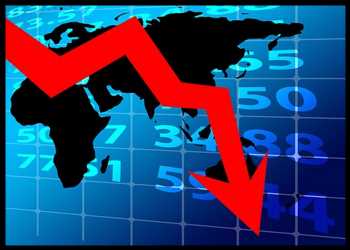
Asian Markets Are Mostly Lower On Recession Fears
Asian stock markets are trading mostly lower on Monday, following the broadly negative cues from global markets on Friday, as ongoing concerns about rising interest rates and fears of a global economic recession continued to weigh on sentiment. The interest rate hikes by several central banks, including the US Fed, the Bank of England, and the European Central Bank, as well as the hawkish tone from them have fueled concerns. Asian markets closed mostly lower on Friday.
The Australian stock market is modestly lower on Monday, extending the losses in the previous two sessions, with the benchmark S&P/ASX 200 staying above the 7,100 level, following the broadly negative cues from global markets on Friday, with the losses in technology and financial stocks, partially offset by gains in gold miners and materials stocks.
The benchmark S&P/ASX 200 Index is losing 12.00 points or 0.17 percent to 7,136.70, after hitting a low of 7,123.10 earlier. The broader All Ordinaries Index is down 12.30 points or 0.17 percent to 7,324.20. Australian stocks closed significantly lower on Friday.
Among the major miners, Rio Tinto is gaining almost 1 percent, while BHP Group, OZ Minerals, Fortescue Metals and Mineral Resources are edging up 0.2 to 0.5 percent each.
Oil stocks are mostly unchanged. Origin Energy is losing more than 1 percent, while Woodside Energy and Beach energy are flat. Santos is edging up 0.1 percent.
Among tech stocks, Afterpay owner Block and Appen are losing more than 3 percent each, while Xero is declining almost 1 percent. WiseTech Global is adding more than 1 percent and Zip is flat.
Gold miners are mostly strong after a spike in gold prices. Northern Star Resources and Evolution Mining are gaining almost 5 percent each, while Gold Road Resources is adding more than 4 percent and Newcrest Mining is edging up 0.1 percent. Resolute Mining is losing 2.5 percent.
Among the big four banks, Commonwealth Bank and National Australia Bank are losing almost 1 percent each, while Westpac is edging down 0.2 percent. ANZ Banking is edging up 0.2 percent.
In other news, shares in Star Entertainment Group tumbled more than 11 percent after the New South Wales government proposed increased tax rates on casino winnings from gaming tables and poker machines.
In the currency market, the Aussie dollar is trading at $0.671 on Monday.
The Japanese stock market is significantly lower in choppy trading on Monday, extending the losses in the previous two sessions, with the Nikkei 225 falling below the 27,300 level, following the broadly negative cues from global markets on Friday, as weakness across most sectors, partially offset by gains in financial stocks.
The benchmark Nikkei 225 Index closed the morning session at 27,221.29, down 305.83 or 1.11 percent, after hitting a low of 27,165.78 earlier. Japanese shares ended sharply lower on Friday.
Market heavyweight SoftBank Group is losing almost 1 percent, while Uniqlo operator Fast Retailing is declining almost 3 percent. Among automakers, Honda is losing almost 1 percent and Toyota is declining more than 1 percent.
In the tech space, Screen Holdings is edging down 0.4 percent, while Advantest and Tokyo Electron are losing more than 1 percent each. In the banking sector, Sumitomo Mitsui Financial is gaining more than 1 percent, Mizuho Financial is adding almost 1 percent and Mitsubishi UFJ Financial is advancing almost 2 percent.
The major exporters are mostly lower, with Canon losing more than 1 percent, Panasonic declining almost 2 percent, Sony down almost 1 percent and Mitsubishi Electric edging down 0.4 percent.
Among the other major losers, Mazda is losing almost 2 percent.
Conversely, Hitachi Zosen is gaining almost 4 percent.
In the currency market, the U.S. dollar is trading in the 136 yen-range on Monday.
Elsewhere in Asia, New Zealand, China, South Korea, Malaysia, Indonesia and Taiwan are lower by between 0.2and 0.8 percent each. Hong Kong and Singapore are up 0.4 and 0.8 percent, respectively.
On Wall Street, stocks showed a significant move to the downside during trading on Friday, extending the sharp pullback seen over the two preceding sessions. With the continued weakness, the major averages fell to their lowest closing levels in over a month.
The major averages regained some ground going into the close but remained firmly negative. The Dow slid 281.76 points or 0.9 percent to 32,920.46, the Nasdaq slumped 105.11 points or 1.0 percent to 10,705.41 and the S&P 500 tumbled 43.39 points or 1.1 percent to 3,852.36.
The major European markets also moved to the downside on the day. While the German DAX Index fell by 0.7 percent, the French CAC 40 Index and the U.K.’s FTSE 100 Index slumped by 1.1 percent and 1.3 percent, respectively.
Crude oil prices fell sharply Friday amid concerns about the outlook for energy demand due to a global economic slowdown. West Texas Intermediate Crude oil futures for January ended down by $1.82 or 2.4 percent at $74.29 a barrel. WTI crude futures gained 4.4 percent in the week.
Source: Read Full Article